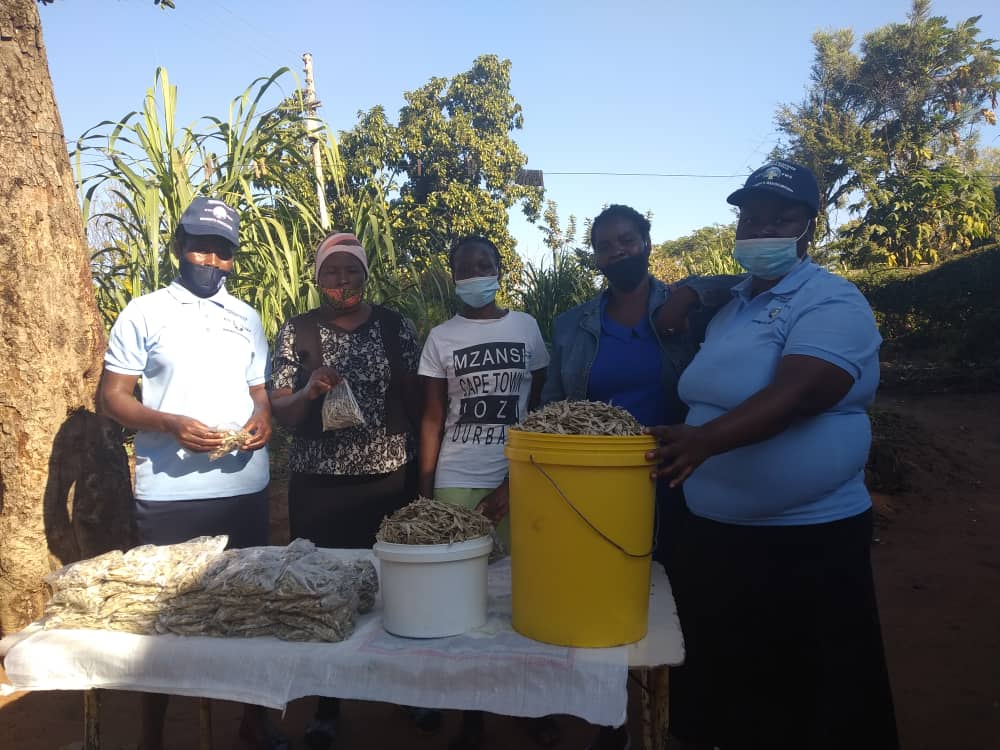Women empowerment a game changer in conservation
Women who are sensitised about environmental issues start businesses with permits from authorities and complying with environmental laws

By Calvin Manika for Community Podium News
Lorraine Mpande of Msuna village in northeastern Zimbabwe’s Hwange District has battled many temptations that could have disrupted the ecosystem and threatened wildlife but says the knowledge she acquired from awareness campaigns by various conservation organisations has helped restrain her.
“In my bush forays during searches for firewood, I sometimes encounter bird’s eggs on trees or dried logs which have become home to other animals and I have to spare them. We have been trained to nurture the ecosystem and not to destroy animal habitats so we refrain from doing them any harm. Basically, for firewood we target trees which have fallen off on their own as we strive to avoid deforestation,” said Mpande.
“Involving women in conservation, a resistance against the unsustainable destruction of natural resources, not only has the potential to empower them but also to positively change their future,” said Onita Sibanda, a Hwange-based feminist.
Women in Zimbabwe largely depend on ecological goods and services. However, the past few years have shown that women can be vulnerable to manipulation due to lack of awareness.
Zimbabwean women often get involved in wildlife trafficking, smuggling ivory and other wildlife products across borders.
The last week of June marked Female Rangers’ Week, a celebration of the bravery and dedication of women in green and brown uniforms fighting the scourge of poaching. From the Black Mamba majority-female anti-poaching group in South Africa, the Akashinga all-female anti-poaching group in Zimbabwe, and the female ranger unit in Virunga, Africa’s women are showing the world that protecting natural resources provides opportunities to rise from social and financial oblivion.
“Educating women and giving them tools for action will lead to lasting improvements in the world’s wellbeing. Women empowerment in wildlife conservation can be a game-changer, as they become true advocates and supporters of nature’s wellbeing,” said Sibanda.
Community Podium’s interaction with the Msuna community established that enhancing women’s empowerment and promoting gender equality could trigger transformative impact in wildlife conservation as well as innovation and efficiency in forestry, climate change mitigation and water management.
Esnath Ncube, a Msuna villager, member of the Women's Coalition of Zimbabwe (WCoZ) and volunteer with various organisations working in Msuna village in wildlife conservation said people need more education on wildlife conservation, especially women, who spend a lot of their time interacting with the natural environment and its products.
“As women we interact with the environment daily and we need more education in wildlife conservation. Some organisations we work with are equipping us with relevant knowledge, especially on protecting the forests, wild animals and our water. The education we get makes us law-abiding citizens even in running our Kapenta business. We have permits. Wildlife-related laws are key for women,” said Ncube.
Another villager, who spoke on condition of anonymity, said starting from village level all the way up to central government, measures must be taken to increase the representation of women in decision-making roles related to biodiversity and environmental governance.
Women and children’s food security is usually affected by wildlife management measures that do not address human-wildlife conflict effectively.
According to African Wildlife Foundation’s Fiesta Warinwa, “African women are the natural custodians of the environment. They pay the price when it comes to the social and economic effects of factors associated with environment and conservation.”
Organisations such as African Wildlife Foundation (AWF) recognise the importance of gender equality mainstreaming in their programs and policies.
“In response to the Sustainable Development Goal 5 on gender equality, AWF seeks to promote a more inclusive approach to advance equality across the continent,” reads an AWF statement.
Another wildlife conservation organisation, Wildchain, also values female empowerment as a tool for wildlife conservation. For years the organisation has been supportive of organisations that work closely with African women in agriculture and wildlife conservation.
Women’s enormous potential to contribute to biodiversity conservation and sustainable development is yet to be fully realised. Gender advocates note that biodiversity loss poses a disproportionate burden for women and girls by increasing the time required to obtain necessary resources such as water, fuel wood, and medicinal plants, which reduces the time they spend on income generating activities and education.
There are women like eco-activist and Nobel Peace Prize winner Wangari Maathai, who led the fight against deforestation in Kenya and inspired thousands more like her to plant more trees.
Despite widespread scepticism on the inclusion of women in decision making, gender advocates say the government of Zimbabwe and its international and national partners are increasingly recognising and advocating for more attention to gender issues.
This article is reproduced here as part of the African Conservation Journalism Programme, funded in Angola, Botswana, Mozambique, and Zimbabwe by USAID’s VukaNow: Activity. Implemented by the international conservation organization Space for Giants, it aims to expand the reach of conservation and environmental journalism in Africa, and bring more African voices into the international conservation debate.
Read the original story here:
Join our commenting forum
Join thought-provoking conversations, follow other Independent readers and see their replies
Comments
Bookmark popover
Removed from bookmarks